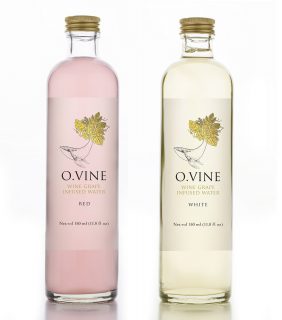
This pure spring water infused with nutraceutical compounds derived from wine grape skins and seeds, creating a new concept of refreshment drink based on two oldest beverages: water and wine.
“I set out to deploy the same social responsibility model I developed several years ago in my previous position as a winery CEO,” said Levi.
The catalyst for Levi was an event at the winery that could have spelled disaster. Yet within it, Levi was able to discover a ripe and decidedly unique opportunity.
“At the end of 2013, due to a technical glitch we lost a third of our raw material,” said Levi. “This caused a huge loss of revenue. An easy solution would have been to lay off half of the employees and dramatically slash costs. I saw a hidden opportunity and instead chose to pursue it, with all of our employees together.”
Through teamwork and focusing on the vision of engaging complete social responsibility combined with sustainability principles of a minimal footprint and maximum respect to people and nature led an innovation process that helped Levi overcome the major challenge she faced. As a result, revenues increased dramatically.
“This proved my instinct to trust one’s employees was on target, to encourage and support them, and to become active and take responsibility,” said Levi.
During wine processing, 25% of the wine grapes—mostly seeds and skins—becomes waste.
“In business, a key goal is to keep waste to an absolute minimum,” said Levi. “This wine waste typically is used for compost or animal feed, but storing and transport costs are expensive. Yet the skins and seeds of grapes are rich in phytochemicals that have been shown to have positive health benefits. The vision of Wine Water Ltd. was to upcycle these typically ‘lost’ ingredients and use them in a product toe to sustain well-being and health.”
The O.Vine line of non-alcoholic premium beverages is the company’s first launch in this effort.
“We intend to launch more innovative food products based on vine grape seeds and skins waste and our goal is to become a zero-waste company,” said Levi.
A primary aspect of the Wine Water vision is based on sustainable values, giving respect and love to people and land. Levi and her team are striving to make this vision alive in building O.Vine brand and vineyards. Here’s how they do it.
Ecological and traceability are a primary concern
Ecological concerns are a primary concern of Levi’s. This extends beyond the upcycling that forms the foundation of the company through reusing “waste” from the winemaking process to create an innovate and exciting product, especially as water-use efficiency is extremely important given not only the vineyard’s climate but the water strain the region already faces.
It all starts with the land itself. The group controls a total of 500 acres of vineyards, some organic, and some certified as sustainable by the Lodi Rules Sustainable Viticulture program. Natural methods of pest control are used and programs are in place in nearly all the vineyards to reduce water usage in the vineyards via a unique system that maximizes irrigation efficiency.
Seventeen of the vineyards use cellular metrological monitoring units that track climate changes 24 hours per day, collecting data to support accurate decisions for irrigation and to understand the microclimate and nature. In most of the vineyards, prunings are crushed, not burned, to reduce air pollution.
Traceability helps provide the control for Levi’s goals.
“We choose the vines, the suppliers, we track every raw material,” said Levi. “We intend to develop more products based on wine grape waste, and have been exploring emerging technology for other products that conform to the zero-waste paradigm.”
Giving back to the community
Levi adheres to quality management project and human resource management practices. These include allocating 10% of all profits to the employees and managing with an open-door policy.
“A business is only as good and successful as its people,” said Levi. “That’s why the company supports long term fairness and is committed to its suppliers and customers. Clear vision and values are part of the company’s culture.”